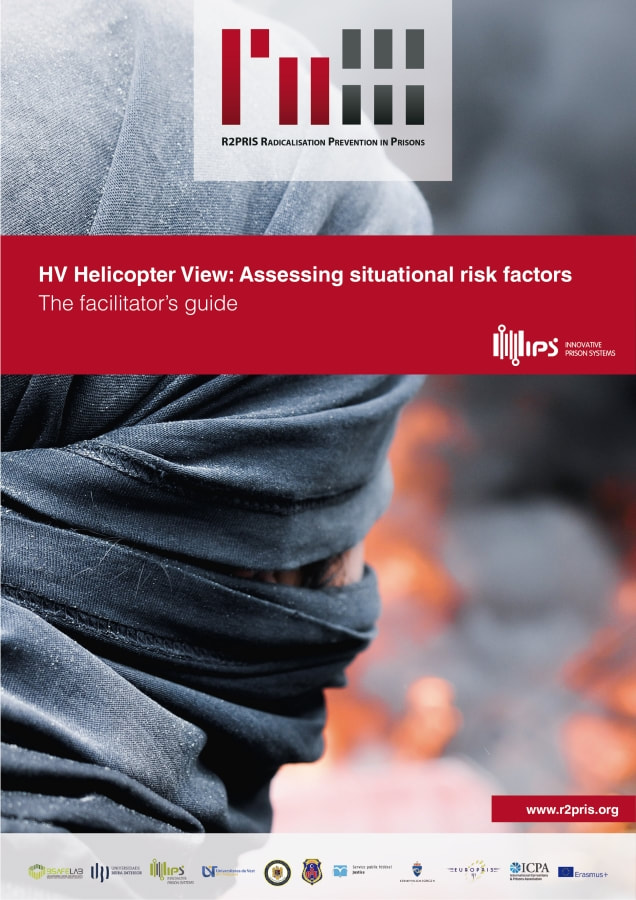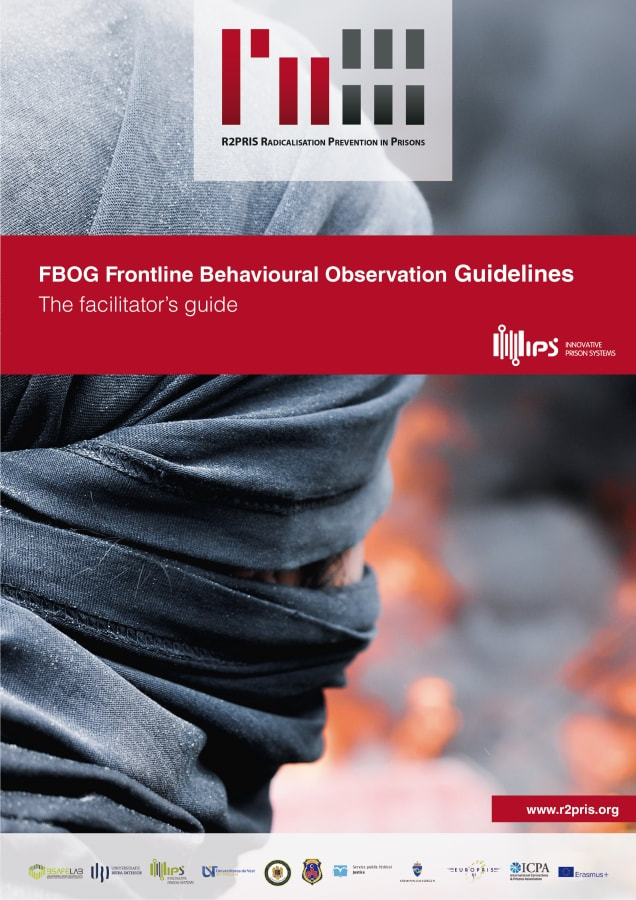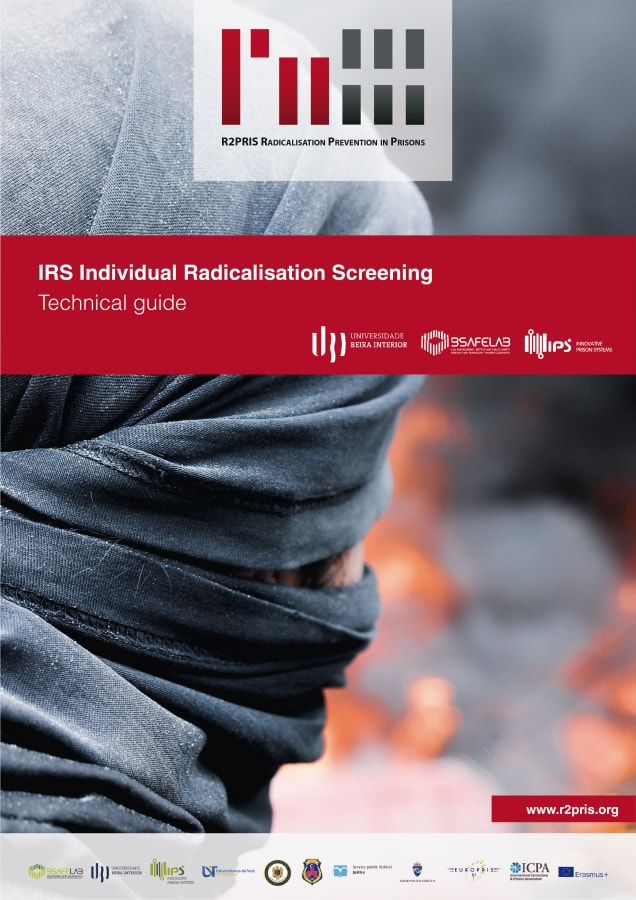The RRAP represents a battery of assessment instruments for prison staff, at different hierarchical levels, to assess the risks, signals and vulnerabilities for radicalisation that may allow them (the staff) to act in specific situations. Therefore, after the literature review, individual and contextual factors were highlighted and a proposed measure was developed considering 10 individual variables plus demographic items and a set of contextual factors. Among the individual variables, some items were adapted from instruments already applied in the prison context (e.g., legitimisation of terrorism) and other items represent an adaptation of variables that were used with the general population.
The RRAP comprises three different measures:
How to cite the RRAP:
Esgalhado, G., Pereira, H., Monteiro, S., Costa, V., das Neves, P. & Reis, S. (2018). R2PRIS – Radicalisation Screening Tool. https://ec.europa.eu/programmes/erasmus-plus/project-result-content/0b4a914e-064a-4dbf-b4b0-db89bcd85c21/IO2_Eng.pdf
The RRAP comprises three different measures:
- The first instrument (the Helicopter View) takes into consideration the role of contextual and situational factors in the process of radicalisation and aims to gather information from prison governors and/or administrators. Therefore, it is intended that the targeted population reflect upon the importance of a few items as well as the urgency to address those vulnerabilities in their prison;
- The second measure (the Frontline Behavioural Observation Guidelines) is directed to frontline staff and was considered necessary because of the higher complexity of the initial proposed technical evaluation;
- The third assessment instrument (the Individual Radicalisation Screening) provides a broad assessment based on putative risk dimensions that have been identified in scientific literature as pathways to radicalisation and violent extremism. Considering different behavioural, emotional and cognitive dimensions related to radicalisation, this assessment will provide a more detailed picture about the risks associated with the specific inmate being assessed.
How to cite the RRAP:
Esgalhado, G., Pereira, H., Monteiro, S., Costa, V., das Neves, P. & Reis, S. (2018). R2PRIS – Radicalisation Screening Tool. https://ec.europa.eu/programmes/erasmus-plus/project-result-content/0b4a914e-064a-4dbf-b4b0-db89bcd85c21/IO2_Eng.pdf
HV Helicopter View
Prison/Prison Administration level
|
An organisational risk assessment tool that aims to raise awareness and support prison governors/prison system administrators to reflect and assess situational dimensions in preventing radicalisation - factors related to prison/prison service and those present among inmates - and to identify the strategies and action plans that need to be implemented.
This tool is targeted to be used in a facilitated session by prison system administrators and prison governors and their management teams aiming to assess radicalisation situational risk factors. Although the tool can be used as a stand-alone tool in a management meeting, experience shows that a facilitated session is more effective to produce results, especially when the facilitator is not a member of the management team that is doing the assessment exercise. Certification
|
FBOG Frontline Behavioural Observation Guidelines
Frontline level
|
An instrument developed to raise awareness about radicalisation in prisons and to support frontline staff (i.e., prison officers, educators, teachers, social workers, etc.) in signalling behaviours/changes in behaviours that can represent the externalisation of cognitive radicalisation in inmates.
This tool was developed to be used by trainers and prison service facilitators in workshops or training sessions with frontline staff in which participants – using a predefined model - are asked to develop “their own” behavioural observation guidelines (the inmate’s behaviours may be different from country to country, or between different prisons in the same country, according to the prison population profile and prison dynamics). Certification
|
IRS Individual Radicalisation Screening
Individual level
|
An individual screening tool that aims to assess inmates risk of radicalisation, following a process view of radicalisation that goes from individual vulnerabilities that can be present at the pre-radicalisation stage to the more extreme involvement (militancy) with radical groups.
The IRS Individual Radicalisation Screening follows a structured professional judgement (SPJ) approach. Therefore, it is key to understand that it represents a structured way to assess individual, inter-individual/group and organisational factors that may contribute to the radicalisation of inmates. Moreover, this instrument needs to be considered in confluence with other existing data on dimensions (e.g., personal factors related to the inmate’s history, behaviours and vulnerabilities) that can be relevant to radicalisation). Questions focus on 46 items in 10 dimensions (emotional uncertainty, self-esteem, radicalism, distance and societal disconnection, need to belong, legitimisation of terrorism, perceived in-group superiority, identity fusion and identification, and activism). All answers must be supported by evidence. Each dimension is scored on a scale which is divided into three categories: low, moderate and high vulnerability. Analysis of the different dimensions reveals whether inmates are likely to be experiencing certain stages of the radicalisation process. Filling the instrument and answering to its items is an iterative process that may require interviewing the inmate, collecting and analysing observation reports, interaction with other professionals (e.g., frontline staff), and the check of available information (from other assessment tools from the psychiatric and psychological domains, to the prison records available that provide behavioural information about the inmate being assessed). Certification
|
Observations: The potential for harm is considerable if the instrument is used incorrectly, or if the user is not familiar with the theoretical and empirical literature pertaining to radicalisation. This instrument can only be used by certified professionals that received the necessary theoretical and practical training and therefore are fully aware of the application realm, strengths and weaknesses of this instrument.
|
The R2PRIS project is co-financed by ERASMUS + programme ( KA2 - Strategic partnerships for adult education). ERASMUS + is the new EU programme for Education, Training, Youth, and Sports (2014-2020).
This website has been accomplished during the project “Radicalisation Prevention in Prisons” - 2015-1-PT01-KA204-013062 (R2PRIS), implemented with the financial support of the European Commission through the Erasmus + Programme. This publication reflects the views only of the author, The Portuguese National Agency ERASMUS+ Education and Training and the European Commission cannot be held responsible for any use which may be made of the information contained therein. © Developed by IPS_Innovative Prison Systems
|





